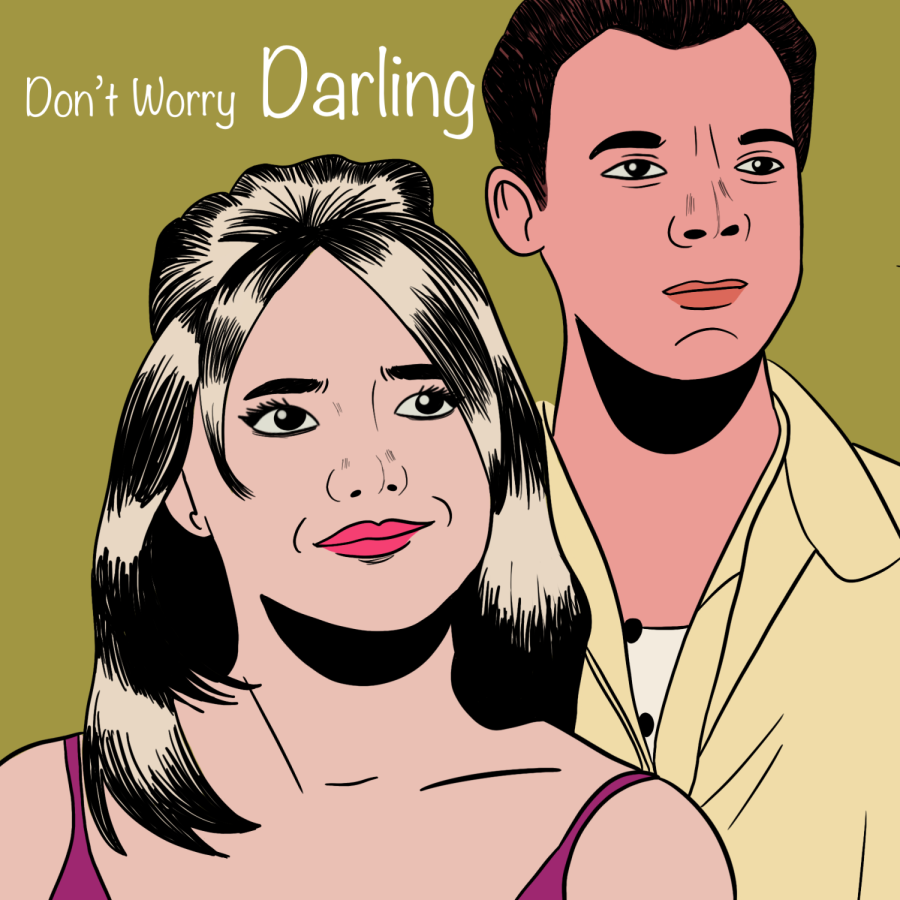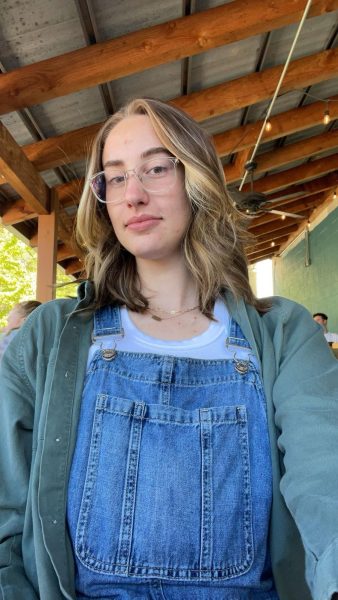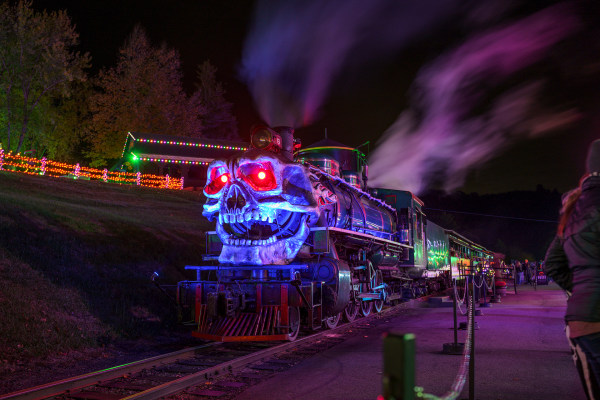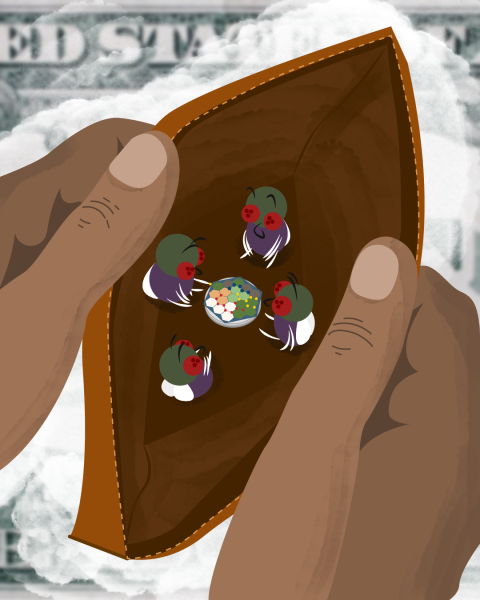Don’t bother, darling: “Don’t Worry Darling” review
October 25, 2022
“Don’t Worry Darling,” Olivia Wilde’s sophomore feature, has a star-studded cast, led by Florence Pugh, Chris Pine and Harry Styles. It features an original script and story. It’s flashy, big-budget and one of the only releases Warner Bros. had remaining in 2022. On paper, it’s everything that makes a major cinematic success. In practice, it makes for a major cinematic failure.
Critically divisive, and plagued with behind-the-scenes production drama, “Don’t Worry Darling” was worrying darlings even before its theatrical release. From allegations of Styles and Wilde disappearing from set, to Shia LeBeouf’s highly publicized and confusing departure from the film, to rumors of Styles spitting on Pine at the Venice Film Festival premiere, the movie attracted vast and varied negative publicity. However, it’s proved only the latest example of “no such thing as bad publicity,” grossing over $80 million on an estimated $35 million budget, according to Box Office Mojo. Judged on financial success alone, “Don’t Worry Darling” should be a hit. Unfortunately, its worries don’t end with how much money it made.
The list of what works and what doesn’t in “Don’t Worry Darling” may be disproportionate, but Pugh’s leading performance has been universally praised. Pugh plays Alice, a young woman increasingly discontented with her idyllic 1950s-style life with her husband, Jack. Jack, as portrayed by Styles, works for the mysterious Victory Project, which their company town is named for. The Victory Project, led in cult-like fashion by the charismatic Pine, employs all the young husbands in Victory, California, leaving their wives at home to shop, cook, and not ask questions. Alice is written as a thin trope. The script paints her as distressed, dumb and delirious, and for much of the second act she moves from one disturbing scenario to the next with a passive and repetitive confusion. Pugh, however, elevates Alice beyond the writing, demonstrating a fully-embodied woman willing to lose her mind to break free from Victory’s domestic spell. The problem is that she has to do it by sheer force of performance. It’s unfortunate that she has been left by the script, Wilde’s direction and her co-star to do so.
Styles is terrible in “Don’t Worry Darling,” which is an issue in a flick attempting to bank on the chemistry of its central relationship. While massively successful as a pop superstar, Styles’ acting is flat, boring and, in places, massively baffling. His approach to the material matches his character’s accent: completely over the top, when it’s present at all. At Boone Regal on the film’s Friday night debut, the audience burst out in laughter during the intended emotional climax for Styles’ character. The camera is entirely on him, and he, much like a plane early in the film, crashes and burns. According to Newsweek, the Boone Regal wasn’t the only theater to respond with laughs. The “Watermelon Sugar” singer turns much of “Don’t Worry Darling” sour.
Wilde, meanwhile, attempts to construct a vision of an America long gone by making a statement about a “period of feminism that ended about 40 years ago,” The Ringer’s Jodie Walker says. Her film is lush, stylized and colorful, with candy-colored cars, dresses and houses aplenty. Her message is ambiguously and morally gray.
In an interview with Variety, Wilde claims her film is about “female pleasure,” and states she neither enjoys nor feels “inspired by stories that oversimplify feminism.” The film itself contradicts these statements. The grand, complex story Wilde tells about feminism in “Don’t Worry Darling” is that, drum-roll please, women should be allowed to work. And despite its eerie science-fiction sequences and Pugh’s best angry faces, the film’s commentary never deepens beyond that. Wilde says that she sought to depict a “misogynist paradise” in the town of Victory, but the men of “Don’t Worry Darling” are often subservient to their wives. There’s an extended sequence where Jack makes Alice dinner in a role-reversing surprise. She is routinely the dominant partner in the intimate side of their relationship. She’s given full leave to go and do whatever she wants during the day. Jack asks for little else in the film other than Alice’s ignorance regarding his work. Every opportunity to make Styles into a compelling foil for Pugh is completely botched in favor of reminding the audience that Pugh isn’t allowed to go to work. This is a conflicting message in a film that alleges a deep understanding of its themes. When “Don’t Worry Darling” answers so few questions and makes its conflicts so shallow, it’s hard not to feel like Wilde wanted to make a movie about how domestic sexism was bad with nothing to say beyond that pitch.
As Manohla Dargis writes for The New York Times, while “the movie’s take on gender roles is stinging,” it doesn’t pick a side of the political aisle. There’s a lack of commitment to the commentary it’s attempting, and in an attempt to be noncontroversial the film becomes nonsensical.
The other men of “Don’t Worry Darling,” while supposedly the villains of the piece, aren’t given much to do either. Pine delivers a couple of menacing monologues, but without a single memorable line. He puts out an appropriately evil exterior, but the lack of information we ultimately uncover about him makes for a hollow interior. The movie’s twist, which won’t be spoiled here, makes this problem worse by raising more questions than it answers, and not in a fun ambiguous way. “Don’t Worry Darling” feels lifeless for most of its 123 minute runtime, despite all the tension promised by its concept. When the main character in your thriller plainly knows something is amiss, the villain is plainly evil, and the central romance is devoid of chemistry, you have the opposite of a “Victory”. You have a cinematic failure.
The film is a thriller without thrill, and social commentary without comment, even with Pugh’s best efforts and Wilde’s best intentions. If you’re debating seeing this one, don’t bother, darling.
Rating:
1/5 Yosefs
















The App fan • Oct 26, 2022 at 9:08 am
Don’t Worry Darling certainly, in my opinion, doesn’t deserve any awards… but this review definitely does!
Not today Satan • Oct 25, 2022 at 11:23 pm
You don’t need a film degree to recognize that the premise of the film was not “women deserve the right to work” but a critique on the very real far right male desires (dare I say say incels) to dominate and subjugate women as a whole. Just say you don’t get it and move on.